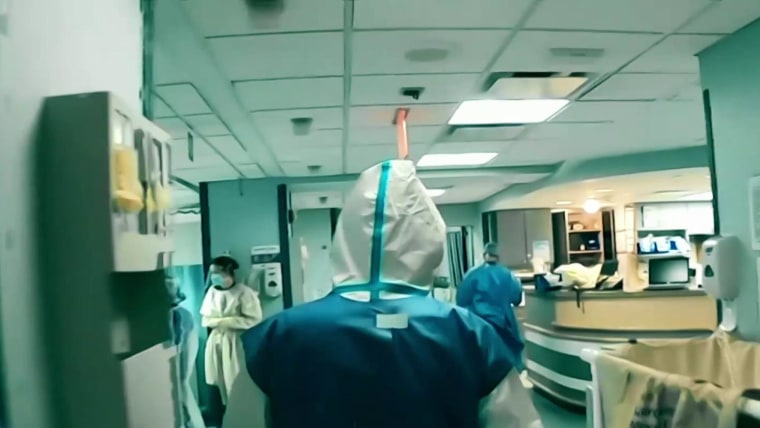Before the pandemic, Dr. Jennifer Spicer used to savor waking up early. In those quiet morning hours, she'd get precious alone time with her dog and brew up a mug of her favorite coffee, using beans from an Atlanta roaster.
Now, she can barely take a sip without spitting the coffee out. Once a source of gustatory pleasure, her coffee now has a chemical smell and taste that Spicer can no longer tolerate.
"I cannot even go in a coffee shop. It smells so bad," said Spicer, an assistant professor of infectious diseases at Emory University School of Medicine. "It's really awful."
Full coverage of the coronavirus outbreak
The abrupt change in Spicer's senses has, by now, an all-too-common culprit: Covid-19. She had a relatively mild case of the virus last summer; in addition to losing her senses of taste and smell, she also had a fever, chills and fatigue for about a week. Her sense of smell and taste did eventually return — but not like before.
Now, Spicer said, certain foods and drinks smell and taste bad. Really bad.
"It ranges from an unpleasant chemical taste to a rotten meat taste," Spicer said, adding that a recent bite of cheese tasted like chalk. Things are starting to improve, but it's been nearly six months since she was infected.
Spicer is far from alone. A study published Wednesday in the Journal of Internal Medicine found that 86 percent of patients with mild forms of Covid-19 developed loss of sense of taste and smell, compared with 4 percent to 7 percent of those with moderate to severe cases.
The research included more than 2,500 patients in France, Belgium and Italy. The majority regained their senses within about two months.
Why loss of smell and taste are more common among people with milder forms of Covid-19 remains unclear. The study's authors theorized that such patients have higher levels of certain antibodies that might limit the spread of the coronavirus to the nose.
A different line of attack
Covid-19 isn't the first illness to lead to a loss of taste or smell. A nasty cold, the flu, even bad allergies can cause nasal congestion that renders those senses useless. But in those cases, using a decongestant can help, even if only temporarily.
Not so with Covid-19, experts say. Instead, the coronavirus dulls those senses through a different line of attack.
"This is an inflammatory process of the nerve itself or of the cells," said Dr. Nina Shapiro, a pediatric head and neck surgeon at UCLA School of Medicine.
A person's sense of smell works like this: An odor molecule enters the nose and lands on a special type of tissue called the olfactory epithelium. This tissue is filled with neurons, which pick up the odor molecule and transport it through the olfactory bulb and into the brain, where it's interpreted as, say, the scent of roses.
The neurons are guided on this journey from the nose to the brain by support cells that act like signposts, pointing the way. But the support cells are covered in a receptor called ACE-2 — the coronavirus's primary target in human cells. That makes the support cells a primary target, too.
Experts hypothesize that the virus homes in on those cells, disrupting the pathway for the neurons to get to their destination in the brain. When that happens, people lose their sense of smell. And smell is directly linked to how a person experiences taste.
There is no guarantee that those nerve connections will ever find their way back to their normal pathways. But the fact that at least some reaction is occurring — even if it means a once-cherished odor now smells like chemicals — may be a good sign.
"We actually think that those nerve endings are trying to grow and repair themselves," said Dr. Bradley Goldstein, an associate professor of head and neck surgery and communication sciences at Duke University School of Medicine in North Carolina. "They're not sending the right signals yet, but things need to heal."
Download the NBC News app for full coverage of the coronavirus outbreak
The smell and taste of food aren't the only sensory problems for people who have had Covid-19. Patients have also had to switch from scented soaps, detergents and deodorant.
Loss or change in sense of smell can be annoying, yes, but Shapiro points out that it can be dangerous, as well.
"If you have a gas leak, you can't necessarily smell it," she said. And if people lose their appetites because food tastes like cardboard or even rotting meat, they might develop vitamin deficiencies. What's more, people might not know when food is, indeed, spoiled or even burning.
The other risk, Shapiro said, is depression. People take great pleasure in food and drink, as well as other basics of human happiness, such as smelling flowers.
"Your nose influences your emotional state. It helps us navigate our world and makes us feel like we're in the right place," said Dr. Sandeep Robert Datta, an associate professor of neurobiology at Harvard Medical School.
"People who lose their sense of smell have a real risk of psychological disorders, including depression," he said.
Spicer, now six months in to her own sensory problems, advises those in similar situations to seek out support groups. "Read about other people's experiences, because it makes you feel less crazy," she said.
"Honestly, you start to wonder: 'Am I being dramatic? Is it that bad?'
"Yeah," she said. "It really smells that bad."
Follow NBC HEALTH on Twitter & Facebook.
"come" - Google News
January 06, 2021 at 05:00PM
https://ift.tt/38l1RKl
Loss of smell and taste can linger after Covid or come back different - NBC News
"come" - Google News
https://ift.tt/2S8UtrZ
Shoes Man Tutorial
Pos News Update
Meme Update
Korean Entertainment News
Japan News Update
Bagikan Berita Ini















0 Response to "Loss of smell and taste can linger after Covid or come back different - NBC News"
Post a Comment